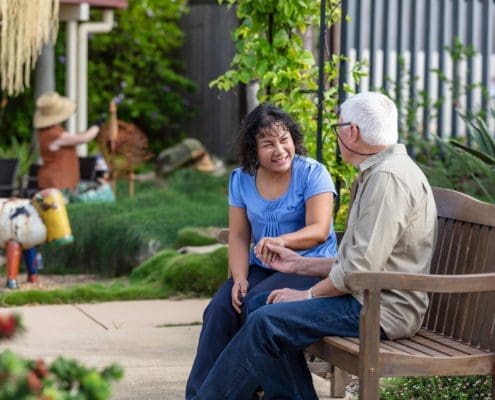 https://seniorsenquiryline.com.au/wp-content/uploads/Safer-Internet-Day.jpg
697
1246
Emily Gould
https://seniorsenquiryline.com.au/wp-content/uploads/logo-sel-400x49-yellow.png
Emily Gould2026-02-06 11:04:572026-02-06 11:34:28Safer Internet Day
https://seniorsenquiryline.com.au/wp-content/uploads/Safer-Internet-Day.jpg
697
1246
Emily Gould
https://seniorsenquiryline.com.au/wp-content/uploads/logo-sel-400x49-yellow.png
Emily Gould2026-02-06 11:04:572026-02-06 11:34:28Safer Internet DaySleep and older adults
Getting enough sleep is vital at any age, and despite previous beliefs, older adults need just as much sleep as younger adults, about 7 to 9 hours per night. However, as people age, sleep patterns often change. You might find yourself going to bed and waking up earlier than you used to. Despite spending enough time in bed, many older adults struggle to get quality rest. If you’re constantly tired or find it hard to sleep well, it may be time to talk to a doctor.
Understanding sleep
Sleep is more than just rest; it’s a complex biological process. Multiple areas of the brain coordinate to regulate your sleep, guided by your circadian rhythm (your internal clock) and sleep-wake homeostasis, which builds pressure to sleep the longer you’re awake.
Your body relies on natural cues to help you fall asleep, such as:
- Melatonin – a hormone that increases in the evening, making you feel sleepy.
- Adenosine – a chemical that builds up during wakefulness and helps promote sleep.
Sleep has two main stages and a healthy night’s sleep means getting enough of both types, in cycles that repeat throughout the night.
- Non-REM sleep – Deep sleep when the body repairs itself and you wake feeling refreshed.
- REM sleep – The dreaming stage, important for processing emotions and memories.
Why sleep matters
Quality sleep plays a key role in nearly every function of your body – from brain and heart health to immune support and emotional well-being. A good night’s sleep can help you:
- Improve memory
- Stay alert and focused
- Solve problems and make decisions
- Regulate emotions
- Maintain energy levels
Lack of sleep, especially over time, can raise your risk for serious health problems such as:
- High blood pressure
- Heart disease
- Diabetes
Sleep deprivation can also lead to:
- Memory issues
- Mood problems
- Increased risk of falls or accidents
- Stress in relationships
How ageing affects sleep
As you get older, your sleep patterns may shift:
- You might fall asleep and wake up earlier
- Sleep becomes lighter and more fragmented
- You may spend less time in deep sleep
Medical conditions, medications, pain, and mental health issues can also interfere with sleep. Older adults are more likely to experience sleep disorders like insomnia, sleep apnoea and restless legs syndrome (RLS). Addressing these issues with better sleep habits and medical support can improve sleep quality.
Tips for better sleep
Good sleep hygiene can make a big difference. Try these habits to improve your rest:
- Stick to a consistent bedtime and wake-up time, even on weekends.
- Establish a relaxing bedtime routine (e.g., reading, warm bath, calming music).
- Keep your bedroom quiet, dark, and at a comfortable temperature.
- Avoid caffeine, alcohol, and large meals before bed.
- Limit daytime naps, especially in the afternoon or evening.
- Exercise regularly, just not within 3 hours of bedtime.
- Keep screens (phones, TVs, computers) out of the bedroom.
- Talk to your doctor if you continue having trouble sleeping.
Sleep and dementia
People living with dementia often experience disrupted sleep, such as waking frequently, sleeping too much or too little, or becoming agitated at night. These disturbances can also affect caregivers. Improving night-time routines and ensuring a safe sleep environment can help manage symptoms.
Sleep safety tips
For older adults, safety during sleep is essential. Consider the following precautions:
- Install smoke detectors to state compliance standards
- Lock windows and doors before bed
- Keep a phone and emergency numbers by your bed
- Use a nightlight or bedside lamp
- Keep a flashlight nearby
- Remove tripping hazards like cords and rugs
- Never smoke in bed
Before starting any sleep aids or supplements, consult your doctor. Sleep medications may help in the short term but carry risks, such as dependence or feeling groggy during the day. Getting restful sleep is essential to maintaining good health as you age. By understanding how sleep works and adopting healthy sleep habits, you can improve your sleep quality, and your overall well-being.
If you’d like more information about sleep and healthy ageing, or if you have concerns about your sleep patterns, help is available. Call the Seniors Enquiry Line on 1300 135 500 to speak with someone who can provide guidance, information or referrals tailored to your needs.















